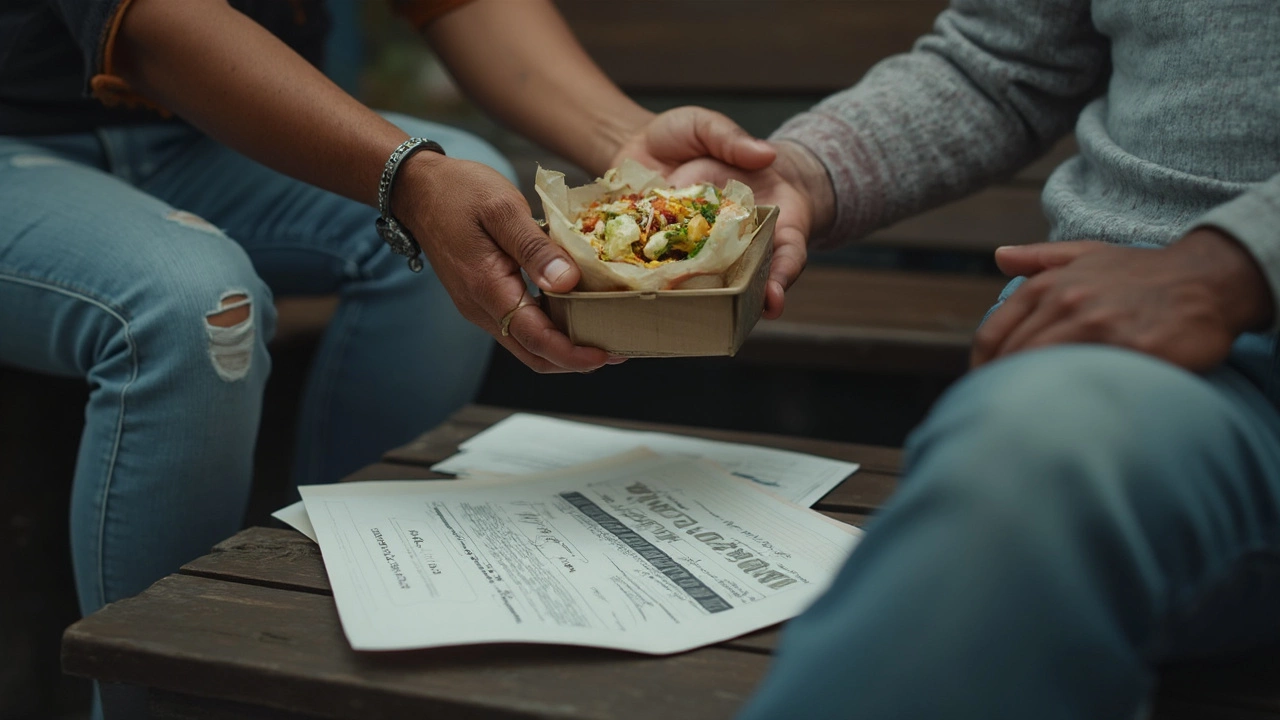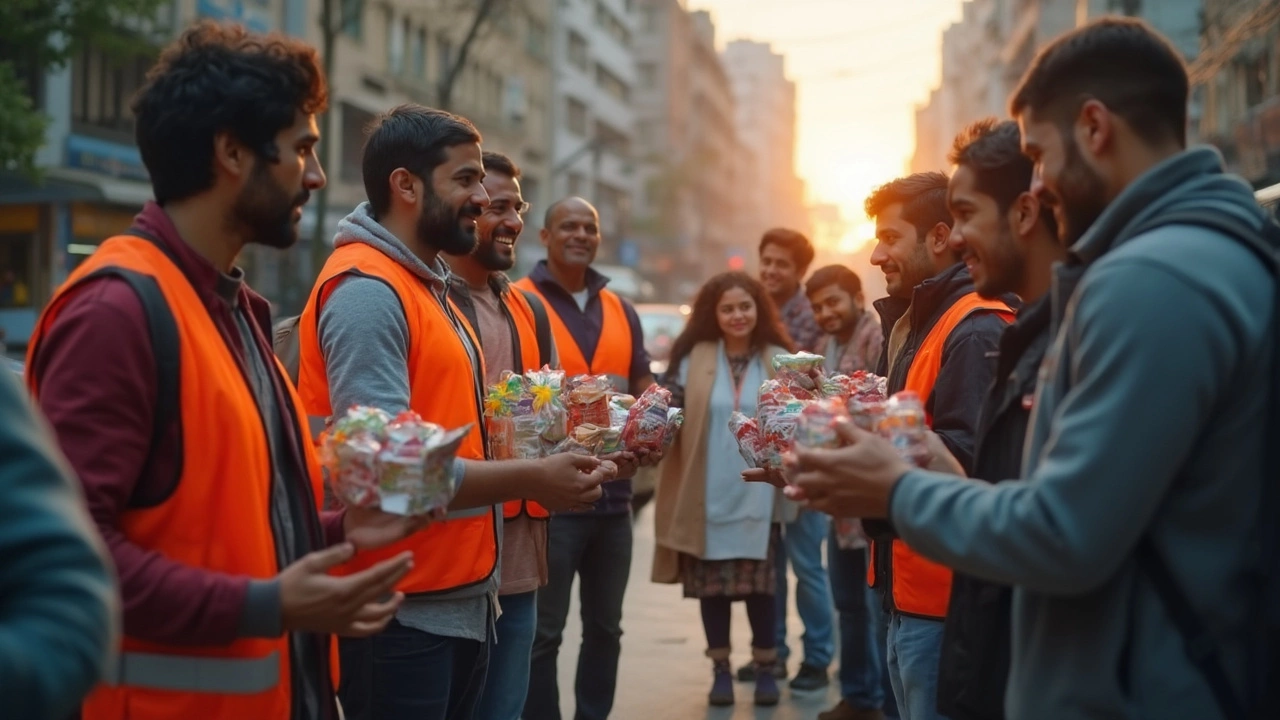Have you ever been handed a sandwich by someone on the street and wondered—can they actually do that? In Houston, it isn’t as clear-cut as you’d think. City rules around feeding the homeless in public parks or streets have confused a lot of good-hearted folks. If you want to roll up with a trunk full of hot meals and hand them out, you might be walking a legal tightrope.
The city doesn’t flat out ban sharing food with someone hungry, but there are plenty of hoops you need to jump through. Houston has rules about where and how you can give out food—especially in public spaces. Some spots require you to get a permit or at least notify the city first. Miss that step, and you could end up with a hefty fine.
This isn’t about trying to scare people away from helping. It's about knowing what’s legally okay before you show up with your casserole. I’ve seen people surprised when police approached them at a park, asking for papers like it’s some kind of pop-up restaurant inspection. So if you want to help, you need more than just good intentions—you need the facts about what Houston’s laws actually say and what steps to take to avoid problems. Let’s get down to what’s really going on and how you can keep helping without headaches.
- Decoding Houston's Rules and Laws
- Why Houston Regulates Public Feeding
- What Happens If You Break the Rules
- Tips for Helping Without Trouble
Decoding Houston's Rules and Laws
If you're thinking about handing out meals to people in need, you really need to know about feed homeless Houston rules. In 2012, Houston passed a city ordinance that made it a lot trickier to just show up and share food in public places. The city says it's mostly about keeping things clean and organized, but the actual law means you can’t go rogue with free meals wherever you feel like.
Here’s what the ordinance actually says: If you want to distribute food to more than five people at once on public property—think parks, sidewalks, or outside government buildings—you’re supposed to get written permission from the property owner. Since the city owns most public spaces, that usually means you need approval from the city!
For big gatherings, you're also expected to notify the city at least 72 hours in advance. There’s a form for this, called a food service event notification. Sometimes, the city also asks that you follow certain sanitary rules: gloves, food safe containers, you name it. This is especially true if you’re handing out anything that isn’t just pre-packaged snacks.
These rules don’t apply if you’re on private property and the owner is cool with it. But if you want to go to city parks or busy corners to help people, you have to follow the procedures—otherwise, you can land a fine. As of now, fines can be up to $2,000 per violation.
| Year Law Enacted | Permit Required? | Potential Fine |
|---|---|---|
| 2012 | Yes (for 5+ people in public) | Up to $2,000 |
It all sounds a bit much, but these are the hoops you’ve got to jump through if you want to legally help in public spaces. Most people don’t realize that the city tracks where public food sharing happens—so if you want to avoid a run-in with police or city officials, follow the steps and keep your Houston law know-how sharp. If you need the forms or want to look up the exact rule, you can check out the City of Houston’s website under "Charitable Food Service" regulations.
Why Houston Regulates Public Feeding
Feeding the homeless isn’t just a random act in Houston—it’s something the city pays pretty close attention to. Back in 2012, the City of Houston passed an ordinance that specifically regulates how and where folks can give out food to people on the street or in public parks. Their main argument? They want safety and cleanliness for everyone, both those giving out the food and those receiving it.
One reason Houston cracked down is public health. The city worried about people getting sick from meals prepped in home kitchens without any oversight. It’s not just about spoiled food; it’s about making sure nobody accidentally spreads something nasty. If something went wrong, the city could be on the hook, or worse, people in need could end up in the hospital.
Trash was another big part of why these regulations kicked in. When food is given out in big crowds, the aftermath can be piles of packaging, napkins, and leftovers that clutter up parks or sidewalks. City workers reported extra clean-up and clogged trash bins in places where big giveaways happened, so officials decided it needed some rules.
The law basically says that if you want to serve food to more than five people at a public site that’s not a private home or private property, you’re supposed to get written permission either from the city or the property owner. There’s even a list of approved locations set by the city, and you need to notify them if you plan a meal service there. If you head to a downtown park, set up a table, and just start serving, you’re out of bounds in Houston’s eyes—you could even be fined up to $500 for each offense.
| Year Adopted | Permit Required? | Fine for Violation |
|---|---|---|
| 2012 | Yes (for public property/in groups) | Up to $500 |
Bottom line: Houston isn’t trying to stop people from helping for the sake of it. They just want it organized, safe, and as clean as possible. When you're thinking of ways to feed homeless Houston neighbors, knowing these rules keeps everyone protected—and saves you from a ticket.

What Happens If You Break the Rules
So what’s the real risk if you ignore Houston’s public feeding laws? People trying to feed the homeless in Houston without following city rules can face fines. If you hand out meals in certain areas without telling the city first or skip the needed permit, police can write up tickets on the spot. These fines usually start around $50 but can shoot up higher if you're a repeat 'offender' or caught during a big group event.
Back in 2012, when Houston first pushed the city’s food-sharing ordinance, several church groups and volunteers didn't realize they needed to notify city officials before serving food outdoors. They got warning notices or tickets. The city normally doesn’t throw people in jail over these violations, but it’s still annoying and pricey. If you think police always look the other way—think again. There have been real cases of volunteers stopped, questioned, and fined, especially in downtown parks where officials keep a close eye on street food distribution.
The city’s main concern is safety and keeping parks tidy, but rules sometimes get enforced pretty strictly. If you get caught breaking them, here’s what can happen:
- You might get a written warning for your first time, but there’s no guarantee.
- Expect a fine—usually between $50 and $500, depending on what happened and if you’ve done it before.
- You could have your food or supplies confiscated, which just wastes your resources and hurts people you wanted to help.
- For groups, fines could get even steeper if several people are ticketed at once.
Here’s a quick glance at the fine amounts issued over the last few years for violating Houston's street food charity rules:
| Year | Number of Tickets | Average Fine Amount |
|---|---|---|
| 2022 | 43 | $75 |
| 2023 | 56 | $120 |
| 2024 | 38 | $60 |
The bottom line—Houston wants to manage public feedings by the rules. If you skip a step, you could end up paying real money. So before you jump in to help, take a good look at the city's process to avoid hassle. It doesn’t mean you shouldn’t help—it just means do it smart, and you’ll save yourself frustration and cash.
Tips for Helping Without Trouble
So you’re fired up to help but you don’t want to get smacked with a fine for handing out hotdogs? Here are some easy ways to avoid breaking Houston law while still making a real impact. First, get clear on the rules—Houston requires most groups feeding more than five people at a time on public property (like a city park or sidewalk) to fill out a simple form with the city’s Health Department. If you’re solo or just helping a couple of folks here and there, you’re in the clear most of the time, especially if it’s not in a park. It takes less than five minutes online if you’re feeding a group.
If filling out forms sounds like a pain, there’s another route. Partner up with a local organization or existing homeless shelter. Groups like the Houston Food Not Bombs and Loaves & Fishes have systems, permits, and best practices all sorted out. You’ll skip the red tape but still play a big part in distributing meals—plus you’ll meet other people just as passionate as you.
Another tip: If you’re planning your own event, keep it small and in a private location like your church parking lot or backyard (with permission, of course). The city isn’t looking to hassle people giving out a few sack lunches quietly off the sidewalk.
- Always check if your location is city-owned or private. Rules change depending on the spot.
- Pick up after yourself—leaving trash can get you cited, even if the food part is legal.
- If you’re offering food prepared at home, stick to simple stuff and label allergens. Houston hasn’t enforced cottage food laws, but food safety matters.
- Hand out water bottles—dehydration is a real danger for folks living outside, especially during Houston summers.
Want some numbers? In 2023, nearly 1,200 people were counted as homeless in Houston’s annual point-in-time count. That’s a lot of people who need help, and plenty of space for folks to lend a hand the right way. One last pro move: snap a quick pic of your paperwork (if any) and keep it handy on your phone just in case someone asks to see it while you’re out helping.
| Key Steps | Why It Matters |
|---|---|
| File a feeding notification | Stays legal with city rules |
| Partner with shelters or nonprofits | Avoids legal hassle and paperwork |
| Clean up after meals | Prevents fines for littering |
Simplest rule: Know the boundaries, respect the people you’re helping, leave the space better than you found it, and don’t sweat the small stuff. When in doubt, just ask—the city’s Health Department actually responds pretty quickly to questions about street food charity efforts.
